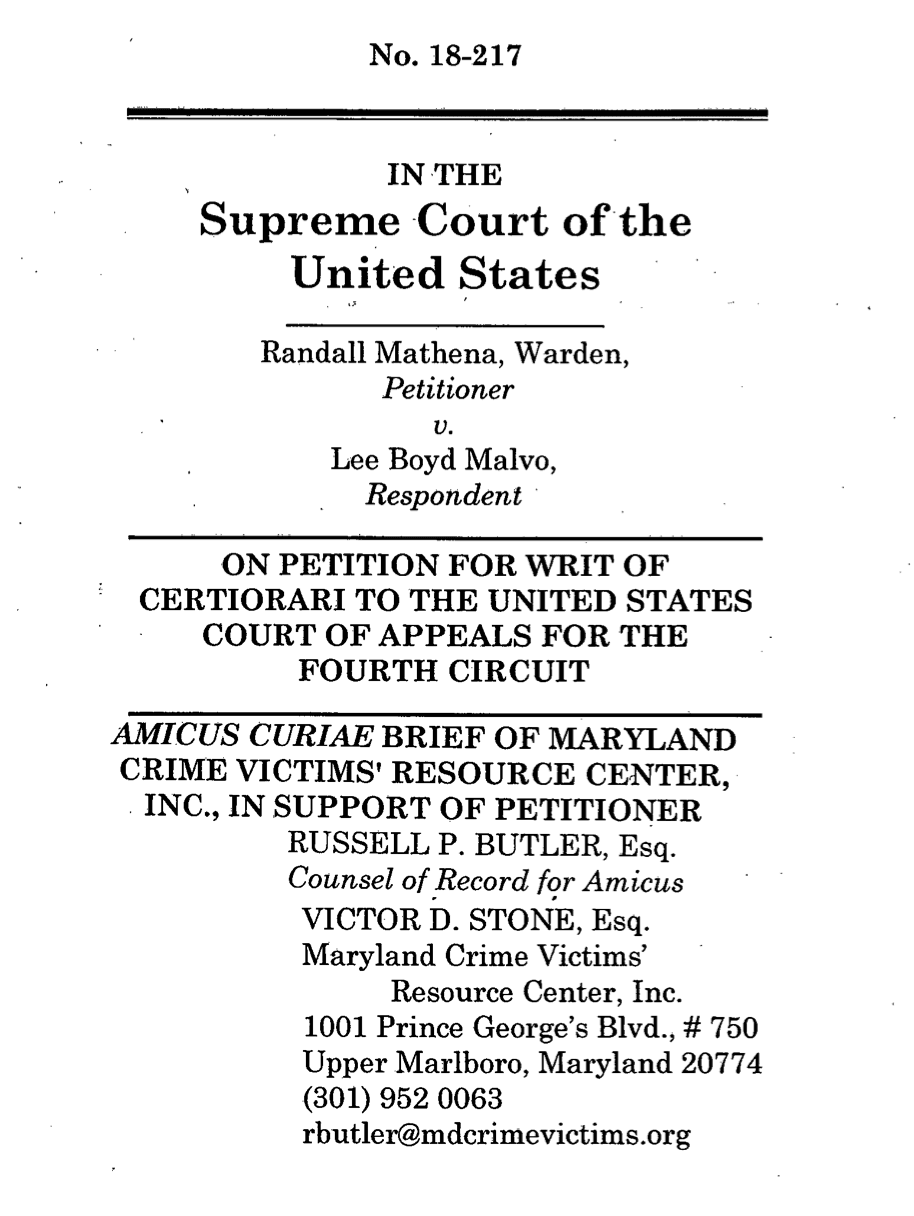
Summary of Argument
Liberty and justice for all does not allow the consideration of only the interests of criminal defendants, but they demand that victims’ interests be fully considered.
The court’s holding below focused upon the jury findings. However, requiring specific findings whether by juries (as in Respondent's Chesapeake City, Virginia cases), or by judges even if there is a plea bargain approving the life sentence (as in Respondent's Spotsylvania County, Virginia cases), was not part of this Court’s holding in Miller and Montgomery.
There are meritorious reasons why this Court did not require particularly worded sentencing findings:
First, this Court’s holdings were directed to and held invalid an entirely different practice, i.e., the inflexible situation where a legislative mandate had automatically and blindly required imposition of life without parole sentences by judges, giving no leeway for consideration of the youth's individual characteristics, and allowed no parole or other release procedure by executive branch officials at the back end of that life sentence which would ever consider the youth's individual characteristics.
Second, requiring particularly worded findings would be contrary to federalism requirements since each state has different sentencing schemes and release laws.
Third, requiring particularized sentencing findings cannot be implemented retroactively because virtually no judicial determination prior to this Court’s retroactive rulings would have been prescient and used the precise words and phrases subsequently announced in Miller and Montgomery. The consequences of judicially constructing and imposing such a formalistic requirement at sentencing, as determined by the court below, means that virtually all juvenile murders that were sentenced to life without parole, no matter how long ago, would, per se, need a new sentencing hearing and victims would have to both intellectually and emotionally re-experience their horror at this crime spree and crime scene more than a dozen years after the original sentencing .
Fourth, focusing on the jury at sentencing overlooks this Court's holding: i.e., that a discretionary release need not be available only at sentencing, but may occur later by other criminal justice system officials if release options are available, in addition to a pardon, at some later time. In this respect, the holding below contravenes this Court's summary reversal in Virginia v. LeBlanc, 137 S.Ct. 1726,1729 (2017). In LeBlanc, Virginia’s geriatric release provisions were not found to be objectively unreasonable and they satisfied this Court's Eighth Amendment Montgomery standard. The court’s ruling below improperly fails to address LeBlanc’s holding.
Fifth and most important to Amicus, the decision below retroactively revising the state's judicial sentencing process overlooks that the sentencing process imposed below will inflict serious harm upon, and will retraumatize and disrespect the victims, to whose interest in avoiding a meritless reopening of their criminal victimization the opinion below gave no consideration whatsoever.
Justice is not only due to offenders, but also to the victims harmed by those offenders. If the victims had only slowly recovered after years of psychotherapy and only recently recovered the psychological ability to speak about how they were victimized, would their desire to avoid being retraumatized be ignored? By statute, victims now have a legal interest in being heard in federal collateral attack proceedings, and their desire not to be unnecessarily harassed and harmed must be weighed against inmates' claims who have little incentive not to seek "free" trips to federal court in order to challenge their state sentencing laws. These federal proceedings are not "no cost" hearings for crime victims. They are anything but "no cost" hearings and they inflict a great emotional and psychological toll on the victims. Congress has addressed this concern and required "fairness" to victims, as well as to defendants, during the litigation of federal habeas actions like this one in 18 U.S.C.§3771(a)(8),(b)(2).
This Congressional legislation is applicable in federal criminal cases and habeas cases from state convictions. It renders moot this Court’s earlier 5-4 ruling indicating that, in the absence of legislation, crime victims had no legal interest in a criminal case. Linda R. S. v. Richard D., 410 U.S. 614, 619 (1973)("a private citizen lacks a judicially cognizable interest in the prosecution"). At the time of the Constitution and the Bill of Rights’ enactments, private prosecution of criminal cases by victims as well as public prosecution was the law of the land. More recently, this Court has recognized that the interests of victims not to be routinely revictimized or ignored by the criminal justice process, absent compelling reasons, was explicitly recognized by Congress.
This Court in Calderon v. Thompson, 523 U.S. 538,556 (1998) articulated the harm that befalls victims and that their interests must be considered. Below, the court’s single-minded focus on the defendant's rights violated the victims' rights under the Fifth and Fourteenth Amendment, since their rights and interests in finality, fairness, and dignity were neither weighed nor paid any heed whatsoever. Victims were treated, instead, as if they were extraneous bystanders, rather than the lawful representative of an indispensable corpus of each murder. Extending Montgomery’s reach, based upon sociological arguments about juvenile rehabilitation, a subject about which trial courts have little or no training and -- unlike the legislative and executive branches of government -- no ongoing jurisdiction, violates the victims' protected interests in finality and the Constitutional separation of powers. In fairness to the victims, whose rights were never even acknowledged below in violation of 18 U.S.C. 3771(b)(1) and controlling state law and sovereignty, this Court should reverse the decision below.